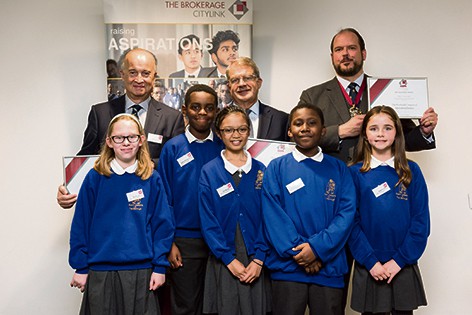A city-based social mobility charity celebrated its 20th birthday with a special awards and celebration evening late last month.
The landmark ceremony of The Brokerage Citylink recognised the support the charity has received throughout the past two decades. The event, which was held in the WalkieTalkie building at City law firm DWF, welcomed Mark Boleat, chairman of the policy and resources committee at the Corporation, as guest of honour – and he shared his experience of working with the charity down the years.
Among the guests were Year 6 pupils from Saint Joseph’s Catholic Primary School, Southwark, who impressed corporate reps with their networking and presentation skills.
The Brokerage has been building links between employers and the local communities surrounding the financial districts since 1996. These relationships enable the charity to help young people achieve their career potential by providing experience of work, employability skills and jobs in financial, professional and related services.
Bridget Gardiner, executive director of The Brokerage, said: “Our vision is a world where a young person’s ability and aspiration alone determine their career path. Whilst we are pleased that there have been huge improvements in social mobility and the employment of talented, young, local people, London is changing and The Brokerage is changing with it.
“These awards acknowledge some fantastic achievements, whilst providing an opportunity for us to engage with new partners in order to offer opportunities for state-school students in disadvantaged schools and boroughs throughout Greater London.”
As well as reflecting on the past 20 years, The Brokerage took the opportunity to announce its future plans.
In January, the charity will be holding a conference in partnership with Tower Hamlets Education Business Partnership and Lloyd’s on what the future of work will look like by 2040.
A recent report suggests that by then, 65% of today’s primary school children will be doing jobs which do not currently exist.







